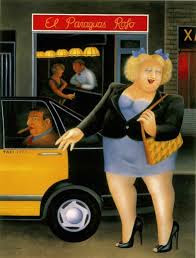Who
remembers reading Ballet Shoes, White Boots, Curtain Up, The Painted Garden, The
Circus is coming, and all those other wonderful Noel Streatfeild books? I still read them with as much enjoyment as
I did when I was a child, but I’ve never got round to trying any of her adult
fiction. So, when I saw A Vicarage
Family (A Biography of Myself, it says on the front), I had to have it. This
is a Fontana Lion published in 1984), so I imagine it’s aimed at children, and
it’s written in the third person singular, which makes it read like a novel,
especially as names have been changed. Noel Streatfeild herself becomes
Victoria Strangeway, the middle sister of three girls, the plain one, the non-conformist
rebel who is always in trouble.
The
sisters, their brother Dick, and their cousin John (who spent much of his time
living with them) seem to have had a very odd upbringing indeed. Their vicar father
was very austere, unconcerned with home comforts or what he considered to be
fripperies – I get the impression that more uncomfortable things were, the
better he liked it. Perhaps he felt it proved how strong his faith was. He had a
strong sense of duty and responsibility to his parishioners, and very strict
standards, not just for himself, but for the children as well, and there were punishments
for quite minor transgressions. In many ways his wife seems to have been as
unworldly as he was, caring nothing for her appearance, or the importance of
creating a beautiful home. A lot of the time she appears quite cold and
hard-hearted, but has obviously been traumatised by the death of a child, at a
point before this memoir starts. Despite all this the children are obviously
loved, and they adore their parents, especially their father.
Religion
obviously permeates every aspect of their lives. The only person I can think of
whose childhood is in any way similar is Jeanette Winterson. Just as she
produced craft work based on stories from the Bible, so Victoria/Noel, her
sisters Isobel and Louise, brother Dick and cousin John, name their rocking Nebuchadnezzar!
Adherence
to their father’s religious principles causes social problems and makes them
feel people will laugh and ostracise them for being different. It’s impossible
not to feel sympathy when they attend a children’s party during Lent, when they
are only allowed to eat bread and butter. At the party they find the bread and
butter is liberally sprinkled with hundreds and thousands; so, not wishing to
appear rude, Vicky and her older sister Isobel eat it… lots of it! And their
younger sister Louise succumbs to a sugar rose from the cake, then acts as if
she’s committed a mortal sin, though I’m not sure if she really feels
contrition, or is just play-acting, enjoying the drama, and looking for
sympathy. Back home they confess to having broken their Lenten fast, and have
to do penance by reading the first nine verses of Matthew IV, where the Devil
tempts Jesus during his fast in the desert.
And
their mismatched outworn, outgrown, clothes cause the girls just as much anguish.
Isobel wears cast-offs from a cousin whose wealthy mother has exquisite taste –
but what suits the cousin doesn’t necessarily suit Isobel. And the copies of
her clothes, made up by a local dressmaker using cheap material, are a
disaster. But neither the girl’s mother nor their father can see anything wrong
with their clothes.
We
follow the family through their move to Eastbourne, accompany them on holidays,
trips to relatives, and school, and we get to meet their family, friends,
servants, and the stalwart Miss Herbert, who is part governess, part nanny,
part maid, part vicar’s secretary, and part home help.
 |
| Noel Streatfeild |
Actually,
I found this slightly disappointing. Like Christopher Milne’s The Enchanted Places,
it offers glimpses into a bygone way of life (Streatfeild was born in 1895, and
her memoir takes us up to the death of Cousin John in the early days of WW1).
However, unlike Milne she doesn’t provide much insight into the way people felt
and thought, and there are no reflections on life, the universe and everything,
no sense of an older person coming to terms with their younger self. It’s a
much more straight forward narrative, but what does come across – and what I
found interesting - is the way Streatfeild’s drew on those childhood
experiences for her writing. All those ‘underdog’ children, the plain, gawky
girls, the outsiders, who lack feminine wiles, girlish charms and womanly
accomplishments obviously have their origin in the young Noel’s childhood and
the way she saw herself. They’re rags to riches stories, where a ‘Plain Jane’
child turns out to be the one with talent, or the one who finds true happiness,
doing what they want to do.
It
would have been nice to see some pictures of Streatfeild and her family, but as
changes their names I suppose this was not possible, because it would have
revealed their identities. Overall, I was disappointed with this book. I didn’t
dislike it, but I felt something was lacking, and couldn’t put my finger on
what that something was. I think it has to do with the fact that is not quite an
autobiography, and not quite a novel: it falls somewhere between the two, and
doesn’t quite come off.



























